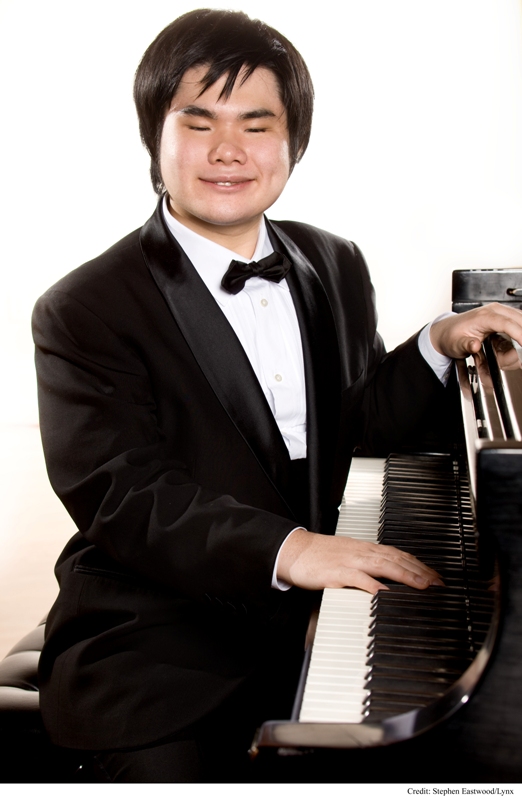Blind “miracle” pianist a marvel, yet artistically a work in progress

Japanese pianist Nobuyuki Tsujii caused quite a stir last year when at the age of 20, he shared the Gold Medal of the Van Cliburn International Piano Competition. That in itself would be quite a coup for any such young pianist, but Tsujii — who is better known by his nickname “Nobu” — has been blind from birth. Van Cliburn himself famously declared Tsujii “a miracle.”
It is indeed a phenomenon that Tsujii can scale fiendishly difficult repertoire without he ability to read a score. Yes, there is Braille music, but a pianist has to read and memorize passages as he goes along, and one cannot touch dots and play at the same time. Tsujii’s modus operandi is for his teacher to digitally record each hand at slower tempos and then Tsujii picks out the parts by ear and gradually puts both hands together at the proper tempo. In this case, however, the end result is happily far more than the sum of its parts.
Escorted to the piano Thursday night at Ravinia’s Martin Theatre in a black tuxedo, Tsujii smiled broadly and carefully set himself on the piano bench. Placing his hands on the piano, he silently touched the high and low points he was about to scale before physically adjusting his torso to allow his hands to be centered where the opening piece began. This ritual repeated itself for each piece, often Tsujii playing a few bars of air piano before actually beginning. Once the sound began, Tsujii would bob his head in recognition of it, which clearly delighted him and the audience.
Tsujii centered himself in quite an immobile fashion all evening, his fingerings and hand positions unorthodox and yet surprisingly effective: he can create a legato line sometimes almost appearing to hack at notes. Phrasing and rubato can be irregular, as can rhythm and dynamics. And virtually every time that Tsujii has to scale a difficult and climactic passage that mandates his complete attention, he begins to breathe loudly in a sustained fashion, adding a veneer of gentle white noise to his performances. At times this was so excessive that Tsujii appeared on the verge of hyperventilating.
His original program was supposed to be an all-Beethoven recital, which would have revealed much more of what this unique artist may be capable of than a safe program of pianistic warhorses. Still, it was a bold choice to open with Chopin’s two Op. 27 Nocturnes and to begin so quietly. One would have liked more mystery and delicacy, but Tsujii has a gentle touch and created a nice dynamic build up and release with No. 1 in c-sharp minor.
Tsujii seemed most at home with the two Liszt pieces, Un sospiro from the Three Concert Etudes and the Concert Paraphrase on Rigoletto, played one after another as if they were movements from the same piece. Tsujii was virtually note perfect but the humor of the paraphrase seemed to elude him.
Two programmatic pieces were spotlighted, Schumann’s Papillons, Op. 2, which was given a perfunctory reading and Mussorgsky’s Pictures at an Exhibition, which gave Tsujii some technical trouble. Still, you cannot help but marvel at a pianist who can convincingly play a thirty-minute suite based on paintings when he has never actually seen one—let alone the representations of Viktor Hartmann that inspired Mussorgsky.
Posted in Performances




